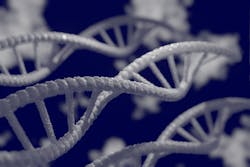Following an analysis of over 12,000 human genes, research from Yale Cancer Center indicates there is cancer-relevant importance in a much larger proportion of human genes than current cancer research models suggest, according to a news release.
Much of cancer biology research focuses on a few dozen well studied genes called “cancer driver genes.” The new findings demonstrate that a larger number of genes are connected to cancer driver genes and may have an impact on cancer biology. The findings were published in the Journal of the National Cancer Institute.
The research team categorized 12,767 human genes into core cancer genes (CCGs) (n=468), one (n=5,467), two (n=5,573), three (n=915), and more than three steps (n=416) removed from the nearest CCG using STRING (Search Tool for the Retrieval of Interacting Genes/Proteins) protein interaction network. The team then estimated cancer-relevant functional importance of the genes using a gene dependency score and determined that a large number of additional human genes, or ‘passenger genes,’ are connected to core cancer genes and could, in turn, influence cancer biology.
The research team found that these previously overlooked “passenger” mutations have functional importance. The extent of their impact depends on the presence of other mutations.
“These findings substantially broaden the repertoire of cancer relevant genes," said Lajos Pusztai, MD, DPhil, Professor of Medicine (Medical Oncology) at Yale Cancer Center and lead author of the study. “It is likely that their biologic contributions are cell type and genomic context dependent and that any given mutation may be functionally important in one person, but not in another individual.”
The study findings suggest a biological model in which many ‘passenger’ mutations in a cancer contribute some function and collectively determine the clinical behavior of each person’s cancer diagnosis.

